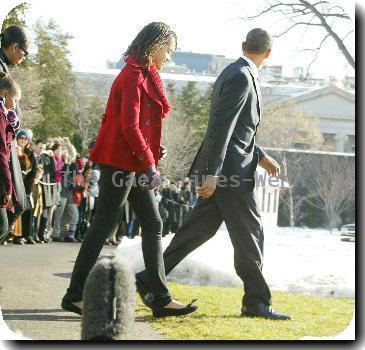Obama’s high court smackdown prompts read-my-lips dissent from a justice and a decorum debate
By Calvin Woodward, APThursday, January 28, 2010
Obama picked odd time and place to jab high court
WASHINGTON — An unusual piece of theater that unfolded in the blink of an eye at the State of the Union speech raises questions:
Was President Barack Obama rude to criticize a Supreme Court decision in the company of the justices?
Was his complaint about the decision, which removed corporate campaign spending limits, right?
Was Justice Samuel Alito’s read-my-lips critique — “not true” — not true?
Republicans huffed Thursday about Obama’s jab at the court. But it was worth keeping in mind that presidents and lawmakers routinely criticize Supreme Court decisions and the justices who make them. Remember Bush v. Gore and the mutterings about a politically rigged court?
Democrats huffed about the huffing and declared that one of the great things about America is that powerful people can disagree in public. But it also was worth remembering that the justices were guests for Wednesday night’s speech to Congress, placed as always in the best seats in the House.
It was an odd time and place for Obama to deliver a Supreme Court smackdown.
The ceremony and courtesies that attend rare assemblies of all three branches of power call on everyone to act with respect for tradition and a certain fellowship, however forced.
Exhibit A: The robed justices only clap at the beginning, the end and the safest moments in between. Their applause is invariably judicious, tipping no hand about their political leanings or whether they actually liked what they heard. No fist bumps here.
Still, this is not a nation of powdered wigs and genuflection.
Authority is constantly, bluntly challenged, although not usually during wedding toasts, funeral rites or State of the Union addresses.
Looking down at the six justices seated in front of him as well as to the wider masses, Obama departed from the scrolling text of his speech and added an unscripted preamble.
“With all due deference to the separation of powers,” he began delicately, then reverted to his prepared remarks, “the Supreme Court reversed a century of law to open the floodgates for special interests — including foreign corporations — to spend without limit in our elections.”
Alito, part of the 5-4 majority in the landmark case, objected to the reference to a century of law upended, to the notion that floodgates have been opened, or both.
In any event, after Obama’s line on those subjects, he shook his head and quietly mouthed words that included the phrase “not true.”
He did not mean for lip-readers to go viral with it. Still, the episode stirred memories of the decorum-shattering shout of “You lie” by Rep. Joe Wilson, R-S.C., during Obama’s first speech to Congress last year.
Republican Sen. Orrin Hatch of Utah said Obama was “kind of rude” in his remark. “It’s one thing to say that he differed with the court but another thing to demagogue the issue while the court is sitting there out of respect for his position,” he told The Salt Lake Tribune.
Obama spokesman Bill Burton saw it differently: “One of the great things about our democracy is that powerful members of the government at high levels can disagree in public and in private.”
Vice President Joe Biden pointed out Obama did not question the integrity of the justices in criticizing the decision.
Instead, Sen. Patrick Leahy, D-Vt., chairman of the Senate Judiciary Committee, questioned the integrity of the justices.
He accused “conservative activists” on the court of making decisions on their “whimsical preferences” and “ideological agenda” instead of the law.
Not one for understatement, Leahy said the decision was even worse than the Bush v. Gore case that settled a disputed election in the Republicans’ favor in 2000 because conservative activist justices “have now decided to intervene in all elections.”
The court’s decision broke a century-old trend of tougher limits on corporate political activity. Specifically, the court said corporations and unions could spend freely from their treasuries to run political ads for or against specific candidates.
Obama was not quite accurate in saying the ruling “reversed a century of law” because the 1907 law in question was left intact.
Nor is it established, as Obama suggested it was, that corporations and foreigners can now have the run of the body politic, given other prohibitions still in place.
Still, those firewalls could tumble over time as a consequence of the court’s broadly-drawn ruling. That would give fresh meaning to an observation made more than a century ago by Marcus Alonzo Hanna, an Ohio Republican operative who systematically hit up businesses for political cash.
“There are two things that are important in politics,” he said in 1895. “The first is money and I can’t remember what the second one is.”
Tags: 2010 State Of The Union Address, Barack Obama, Events, Executive Branch, Joe Wilson, Judicial Elections, North America, State Of The Union Address, United States, Washington

